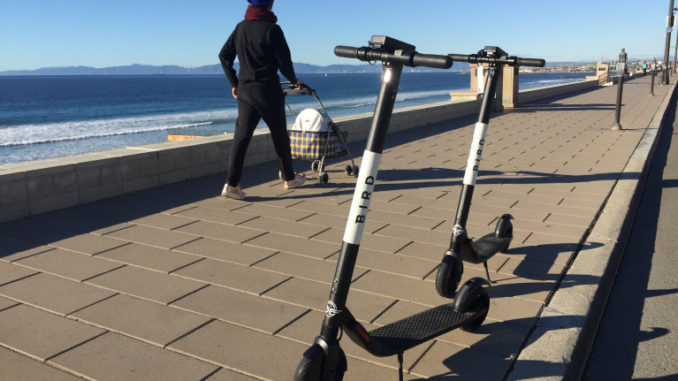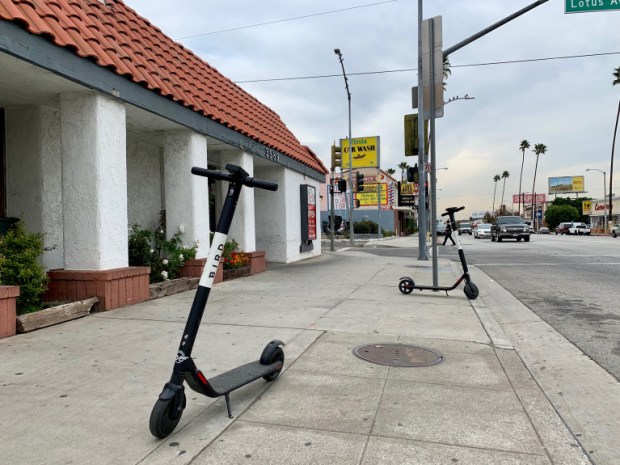
Like Uber and Lyft before them, the latest Silicon Valley startups also showed up uninvited, dropping electric scooters, battery-powered bicycles and other dockless, micro-mobile rentals onto streets and sidewalks of Southern California.
The guerrilla marketing strategy aimed at busting the monopoly of the single-passenger car created multiple battlefronts in today’s “Scooter Wars,” sending some cities to the courts claiming they are a nuisance and an eyesore, and others writing regulations that keep them off the sidewalks and target public safety and aesthetics.
While some, such as Beverly Hills and West Hollywood, sent in law enforcement and confiscated the scooters, banning them entirely, others, like Santa Ana and the county of Los Angeles have put away the stick and opened up a dialogue of diplomacy.
The Los Angeles County Board of Supervisors voted unanimously Tuesday to direct staff to draw up regulations for all dockless e-scooters and bicycles using the public right-of-way by early March.
One of the reasons why the board began negotiating with Bird, a $2-billion company operating in 100 cities, was simple: It would lose in court.
“We originally had in there ‘cease and desist’ but it was language we couldn’t uphold. We don’t have the legal ability,” Supervisor Kathryn Barger said.
Scooter wars
Bird, and also Lime — the two most prolific dockless-scooter-and-bicycle-rental companies — have a foot in the door and a seat at the negotiating table in numerous municipalities and county governments.
In short, they may be winning the scooter wars.
Earlier this year, while Hermosa Beach and Manhattan Beach each issued moratoriums on dockless bike and scooter rentals, the city of Redondo Beach did not.
Even though tensions rose and Bird eventually removed about 300 scooters dropped without permits, Redondo is still willing to consider a program with Bird.

The strategy worked in Santa Monica and Los Angeles. They found scooters on their streets without permits, yet eventually created pilot programs.
Santa Ana is allowing Bird to scatter scooters in town, in exchange for data on where riders picked up the scooters and where they dropped them off. This can help planners design future micro-mobility lanes or even additional bus stops.
Scooter companies typically offer a smartphone app that can be used to locate vehicles and pay to borrow them. The electric scooters are usually placed early in the day at convenient locations and then collected at night for recharging.
Likewise, Bird tussled with city of Pomona by placing scooters on city streets without permits.
“That is how they introduce themselves,” said Deputy City Manager Mark Gluba. After convincing them to remove them, the two sides sat down to talk, he said.
Pomona is working on an ordinance to allow dockless scooters and bicycles. It will go before the City Council in a few weeks, he said.
“Their strategy is it is easier to seek forgiveness than ask permission,” said Denny Zane, executive director of Move LA, a nonprofit that works on solutions to transit issues, air pollution and climate change.
Zane said cities must develop regulations for dockless e-scooters and bicycles. Otherwise, they can end up sprawled on sidewalks, blocking wheelchair access or causing accidents.
” I almost got run over on a sidewalk by a girl on a scooter. She was on the sidewalk,” said Zane, a former mayor of Santa Monica.
Environmental benefits
Zane, and many others who study mass transit, see electric scooters as positive replacements for automobiles, which produce 4.6 metric tons of carbon dioxide per year.
Those riding electric scooters may be forgoing cars for a short trip to the market, to attend class or meet a friend for dinner.
Barger said she believes the e-scooters in unincorporated areas of Altadena and East Pasadena were purposely placed near the Gold Line light-rail stations and bus stops along Rosemead Boulevard, Huntington Drive, Lake Avenue and San Gabriel Boulevard.
She said scooters and dockless bike rentals could become a good option for people to reach impacted parking lots at Gold Line stations in Irwindale, East Pasadena, Arcadia and Monrovia.
“As a member of the (LA Metro board), we have a responsibility to look at solving the first-mile, last-mile problem,” Barger said. “We are trying to get people out of their cars.”




